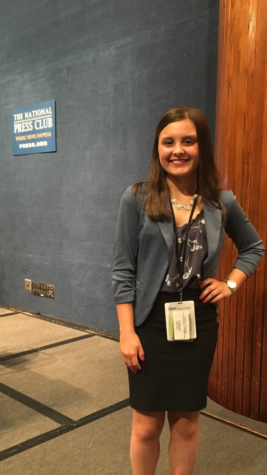The Second Half of High School: The Troubles and Triumphs of Determining the Future

June 8, 2017
Whenever someone asks me what I want to do for a career and I reply “I want to go into English,” I am faced with a grim look of disappointment and pity.
I am constantly told by family members, teachers, and friends that I am heading out on a dark journey and that I am entering into a dying field — one that has no opportunities or future for me. I have been asked why I want to go into English more than I have been praised or accepted for it without comment. Usually these remarks are the same across the board: Why don’t you go into science? It’s in high demand right now and pays well.
Up until high school, I always received the same advice from my family, teachers, and friends: discover your passion and pursue it. However, at this point in high school, that ancient message of doing what I enjoy has completely disappeared. The message I now receive circulates around profitable fields and careers that are in-demand. In my experience, there is only one field that fits this criteria.
And that field is STEM (science, technology, engineering, and math).
However, it is impractical for every student to enter a STEM field because (1) there won’t be enough jobs and (2) the plan completely closes down all other fields, most of which are essential to a functioning society.
While there is no denying that STEM careers are extremely valuable to our world and that they pay well, they are not the only options young adults have when choosing a college major or career. American society depends on a multi-faceted workforce — while farmers are responsible for the food that feeds us and the military is responsible for protection, journalists are responsible for keeping democracy alive. A free press is essential to the checks and balances of the American political system. Without it, the American people become both blind and deaf.
My decision to pursue English should be just as valid as someone who wants to pursue engineering or medical studies. However, that is almost never the case, which led me to observe and analyze what drives these social standards and if it is beneficial for students to follow them.
Senior Grace Goodwin is a declared elementary major but sees herself moving more towards a speech language pathologist for special needs children at Bridgewater State University. Senior Kathrine Esten is pursuing a career in political science at the University of Massachusetts at Amherst. Junior Abigail Cadorette plans on pursuing business with a major in finance and a minor in marketing or management.
While Grace states that she was always interested in working with children, Kathrine says that her interest in political science was always on the backburner.
Despite what career students choose to pursue, doubts will always be present, regardless of “social acceptability.”
While Grace sees a downside in elementary education as the limited profitability, she also believes that teaching is very beneficial. She states that teaching enables her to shape young minds and to mentor people to understand “not just what’s in the book, but right from wrong, and what it means to be kind.”
Kathrine believes that some of the benefits to political science include the ability to help people and make a difference by drafting policy that will develop the American economy and trade. She also understands that there are downsides to pursuing politics: the money is limited and common stereotypes cause people to hate politicians.
Abigail, though pursuing a “socially acceptable” career, says that one of the downfalls includes being stuck at a computer or a desk all day. However, she believes some of the benefits of going into business include its profitability and opportunities for advancement.
Somerset Berkley had a major impact on these students’ career choices. Grace’s involvement in the extracurricular activities Future Teachers of America and Unified Track, the classes that Katherine took in high school, such as AP (Advanced Placement) United States History, AP World History, and AP Government and Politics, and Abigail’s involvement in the extracurricular activity DECA (a business competition club), influenced their decisions to select their chosen fields.
All three students also experienced changes in their career decisions. Abigail Cadorette actually wanted to pursue a career as a physician’s assistant for a long time because many of her family members are involved in the medical field and she finds the advancements in medicine very interesting. She decided that being a physician’s assistant was not for her after she shadowed a couple health care professionals. Not liking the sight of blood was also a deal breaker, of course.
“I have been doing DECA (Distributive Education Clubs of America) for the past two years and my partner and I have been very successful at it,” says Abigail. “Over time, I have grown a passion for business.”
Throughout high school, Grace Goodwin, Kathrine Esten, and Abigail Cadorette reached many points where they were stuck between a rock and a hard place. They were forced to choose between following their passions or following the social standards that are set by society.
Kathrine Esten faced many challenges upon entering into politics. These challenges have paved the way to many doubts, including whether government actually works or if she will be any good at it.
However, Kathrine finds inspiration to pursue her dream in the history of our nation: “we’ve gotten through so much [as a country], and it takes hard work from regular people to do great things.”
While Abigail is not necessarily concerned about the paycheck or the job opportunities, she worries that she will not have the right connections to be successful in the business world after college.
Grace Goodwin faced many challenges from those around her about her pursuit of elementary education. Because of this, she continuously wondered: “Should I follow the path that makes more money?”
She decided no.
“At the end of the day, I want to be happy in life, even if it means I’m broke,” says Grace.
Social standards of “respectable” careers undoubtedly drives people’s career choices and their doubts about their chosen paths.
Grace Goodwin says that “good” jobs in our society are defined by their salary while “in far too many cases, the most important jobs don’t make a lot of money.”
Kathrine Esten recounts her personal experiences with these social standards as a child: her career needed to make enough money and make an impact but could not be about fame or fortune; she had to be interested but she could not have fun.
“It’s a societal thing of people being judgmental about career choices that we are all subconsciously aware of,” says Kathrine.
Many students today face similar problems to Grace, Kathrine, Abigail, and myself — these are some of the most common doubts that young adults have when looking towards college and beyond. However, despite these questions of profitability, respectability, and discouragement from family, teachers, and friends, all three students encourage others to choose the career that they enjoy, even if it means sacrificing the social “acceptability” of their career choices.
Grace Goodwin says that her family is worried about her decision to pursue elementary education. They are mostly concerned about post-graduation paychecks, but Grace decided that she does not want to make a lot of money at the expense of her own happiness, and for that reason, her family is beginning to accept her decision.
Kathrine Esten also says her family is also not thrilled with her career choice. However, she is sticking with her decision to pursue politics but will double major or minor in economics or statistics so that she could find another career if she had to.
Abigail Cadorette states that her family is supportive of her decision to enter business, even though most of them work in the medical field. “My mom has told me that whatever made me happy made her happy,” says Abigail.
Ultimately, “it’s better to spend your life working at something you care about rather than wasting it because other people expect you to,” says Kathrine.


